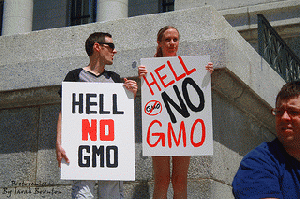Reprinted from medium.com
A new study commissioned by the Norwegian government, and conducted by a nationally recognised scientific authority on the safety of biotechnologies, concludes that available scientific data on GM crops is inadequate to prove their safety.
The new study analyses a dossier by giant agribusiness conglomerate, Monsanto, submitted to the Brazilian government, and also conducts a comprehensive review of the available scientific literature from other sources.
Its focus is on Monsanto's GM soybean Intacta Roundup Ready 2 Pro, which is grown in Brazil, and also authorised in Argentina, Paraguay and Uruguay, and probably also present in Bolivia due to illegal introductions from neighbouring countries.
The report, titled 'Sustainability Assessment of Genetically Modified Herbicide Tolerant Crops' concludes that due to major gaps in the scientific literature, it is not possible to give a scientific verdict on their safety. Monsanto's dossier, the report concludes, demonstrates a range of methodological weaknesses, and highlights the problem of incomplete information and research on GM crops in the available literature.
According to Monsanto, genetically modified organisms do not harm human or animal health, and therefore do not have any adverse effects on crops and the environment.
But according to the new Norwegian study:
"Contrary to this assertion, the literature provides indications of harmful and adverse effects to the environment and to health (both animal and human), as well as to socio-economic conditions, particularly over the medium- and long-term."
The new study is authored by Georgina Catacora-Vargas, a researcher at the Agroecology Centre (AGRUCO) at the Faculty of Agricultural, Livestock and Forestry Sciences, University Mayor de San Simon, Cochabamba, Bolivia. Catacora-Vargas was until recently technical biosafety advisor at Bolivia's Vice-Ministry of Environment, Water and Forestry Management.
"Statements of the safety of GM crops rely principally on the absence of evidence of harm in specific research tests, rather than actual evidence of safety," said Catacora-Vargas:
"Absence of evidence of harm is a too low standard for adequate protection of human and environmental health" Moreover, today, a large portion of the research on GM crops is based on short-term studies that have inherent methodological weakness for detecting subtle yet significant effects that materialise in the long-term. Another common weakness"--"as indicated in my report"--"is the lack sufficient analytical rigour to derive any meaningful conclusions."
According to her report, the large number of studies indicating positive impacts of GM crops are questionable because of such "methodological limitations," which largely ignore "possible long-term effects" and used a "reduced and repetitive set of indicators."
Most of this research does not compare GM crops with other production systems, such as IPM (integrated pest management), organic, and agroecological; focuses exclusively on "single-trait" GM plants rather than, more realistically, "the combinatorial and additive effects of multiple-trait GM crops"; and is based on experiments which do not adequately consider "real field conditions."
"These limitations," the Norwegian report concludes, "partially explain the kinds of findings reported by the applicant [Monsanto]: all of them showing no possible adverse effects in contrast to a significant body of literature."
(Note: You can view every article as one long page if you sign up as an Advocate Member, or higher).






